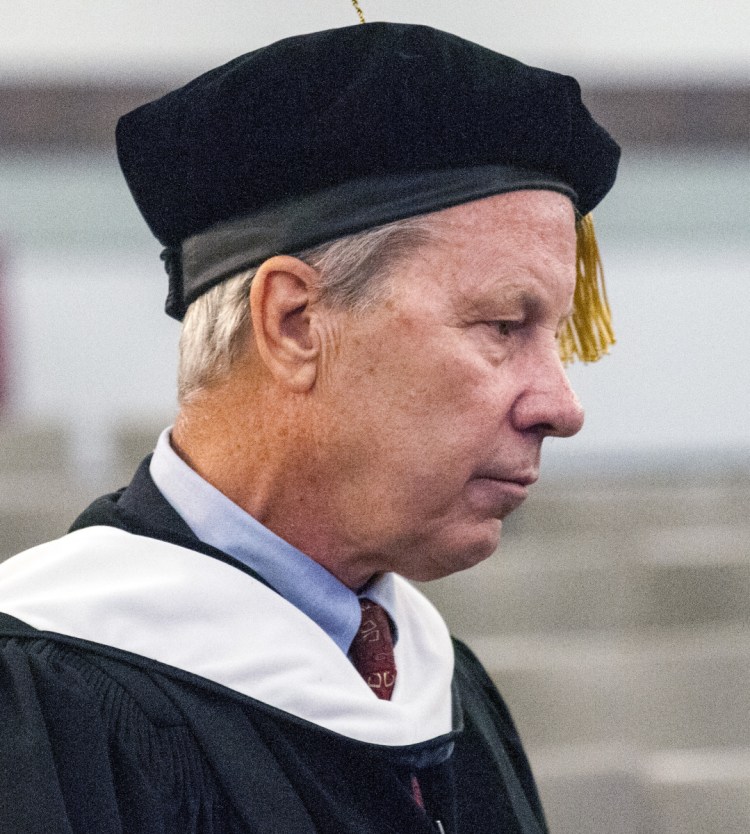AUGUSTA — “The best stories don’t come to you. You have to go find them.”
Journalist and author Ben Bradlee Jr. delivered the keynote address Friday at the 2018 University of Maine at Augusta Convocation at the Augusta Civic Center. Bradlee reflected on The Boston Globe’s investigation – which he oversaw as editor – into the sexual abuse scandal that rocked the Catholic Church in 2002.
Each school year at the university is assigned a theme, and this year’s is freedom of speech. UMA President Rebecca Wyke said one of the most important aspects of educating students is teaching them critical thinking, especially in a volatile political time.

Rising Scholar Jacinta Hunt, left, and Lorigan Lake-Corral, the professor who nominated her, bump fists Friday during the entrance processional at the UMA convocation.
“Freedom of speech is the freedom to be loose with the facts,” she said during her introduction. “Each of us must then rely on the most hallowed product of the liberal arts educations: our ability to think critically in order to navigate the babble and discern who is behind the information and what is their intent.”
The Globe’s coverage, which showed a systematic cover-up by high-ranking Catholic officials of priests’ sexual abuse of numerous children in the Archdiocese of Boston, won the Pulitzer Prize in 2003. The reverberations of the story continue today, Bradlee said.
“Sexual misconduct actually seems too tame a term to describe what hundreds of priests did in the Archdiocese of Boston, mostly to young altar boys,” he said during his address. “These were rapes, really, and they were the ultimate abuse of power committed by men who held positions of moral authority.
“This story took off like nothing I had ever seen before,” he added. “In addition, newspapers around the country began investigating dioceses in their areas and finding the same abuses.”
The investigation was highlighted in the 2015 film “Spotlight,” which won two Academy Awards for Best Screenplay and Best Picture.
“None of us could have dreamed it was possible,” Bradlee said of receiving the award. “The movie has had a greater impact than the original stories did.”
Bradlee said the film underscores the importance of investigative reporting by newspapers, which he said is not considered to be as necessary as it once was.
“Mostly this is because newspapers are struggling to survive in the internet era,” he said. “Most young people these days seem not to care about reading a (newspaper) thoroughly.”
Bradlee has ties to Maine, and even Kennebec County. The New Hampshire-born writer graduated from Colby College in 1970.
While he’s out of the newspaper business, he spent 30 years in journalism, including 25 years at The Boston Globe.
“Even though I’m now considered an author, I still consider myself a newspaper guy,” he said.
Bradlee plugged a book he wrote that is scheduled for release Oct. 2 and titled “The Forgotten: How the Abandoned People of One Pennsylvania County Elected Donald Trump and Changed America.” He said Trump dominates the news cycle and it has divided American citizens like never before, calling Trump’s opposition to mainstream media “dangerous.”
“America today is so divided that people can’t even agree on what facts are,” he said. “Most people are retreating to their own sides of the ideological divide.”
Friday’s ceremony, a curtain-raiser for the academic year, also recognized 88 Rising Scholars who demonstrated academic achievement. Each scholar is nominated by a faculty or staff member at the university.
One such Rising Scholar is nontraditional student Amy Bley, 22, of Readfield. Bley began her college education at UMA but transferred to a larger university in Canada. She returned to UMA to finish her schooling, a decision her mother, Emily, said was the right move for her.
“She’s really blossomed,” Emily Bley said. “This has been a great place for her.”
Amy Bley said the theme of freedom of speech is important to all students because they are constantly learning and forming opinions.
“Freedom of speech means, to me, that we can share those opinions whether or not they agree with others in the class,” she said. “(If) we have things we feel strongly about, we should be able to speak about (them.)”
Amy Bley said she “really enjoyed” Bradlee’s address.
“I think it was encouraging to people working on getting an education,” she said. “I think that (it’s) important … to be able to become prominent people in society and share their opinion.”
Send questions/comments to the editors.




Comments are no longer available on this story